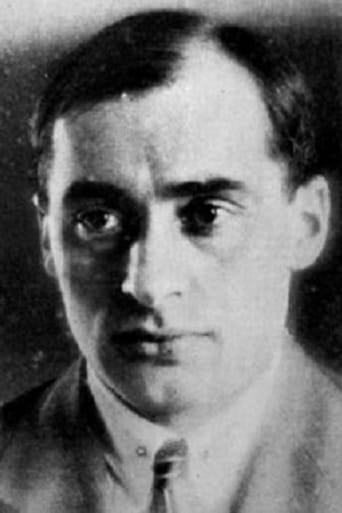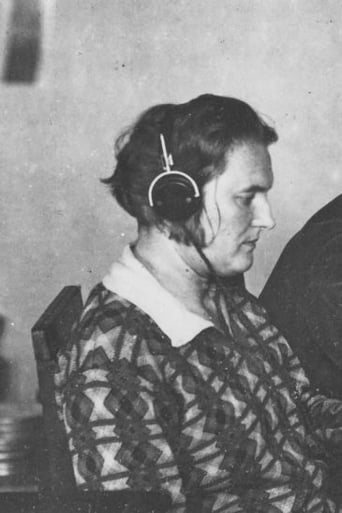KnotMissPriceless
Why so much hype?
PlatinumRead
Just so...so bad
JinRoz
For all the hype it got I was expecting a lot more!
Kaydan Christian
A terrific literary drama and character piece that shows how the process of creating art can be seen differently by those doing it and those looking at it from the outside.
Nikolai Alcomendras
Man with a Movie Camera, directed by Dziga Vertov, is a unique film. It has no actors nor story, it is a film within a film. It takes place in an urban setting, a montage of the urban life in and around a Russian city. The film anticipates many of the techniques that is celebrated even up to this day, it is timeless in its unique ways. The title describes what is happening: we see the cameraman recording the images we are seeing. An important aspect of this film is in the way scenes progress and the types of montage established, the film's main subject is basically the man and cinema. A revelation of the film is acknowledged for introducing many camera techniques like double exposure, fast motion, slow motion, freeze frames, jump cuts, split screens, extreme close-ups, tracking shots, backwards footage and stop motion animation. Today, it is widely used and developed.Other than Vertov's revelation of camera techniques, Man with the Movie Camera opened different point of views on how the film is being perceived. Many parts of the film showed machinery and factories - the mass production and consumption of image. Even at the beginning of the film, how the theater depicted the daily life of different classes of people. The difference between the working class and the upper class is shown in several scenes. As seen in the film, there are scenes wherein the busy lives of laborers working in factories contrast to those people enjoying the beach and watching sports. In Marxist ideology, Vertov's portrayal of industrialization, is one of Marx's arguments was that the bourgeoisie abused the proletariat. How the bourgeois industriousness ignored the origins of their wealth – the exploitation of the proletariat, the urban workers, which on my opinion is quite evident in the film. It's amazing how simple activities captured on camera create an impact on how the world is then dictated by social status.Additional points to support my observation, there is another scene in the film when a woman waking up started to wash her face then cut to high pressure water cleaning off a pole. Next cut is the scene where the woman begins to wipe herself with a cloth and then the film cuts to another woman wiping off a window with a similar cloth. Then the same woman starts blinking her eyes the blinds on the windows start opening, just like the eyes of the woman. It also may imply the idea of the growing importance of machinery and highlighting the fact that machinery is an important component in film and that the only way a film can be a combination of hardworking human laborers are like machines. Issues raised throughout the film is not just timely during Vertov's time of recovery from war, it is timeless in a way that even with the absence of war today, capitalism and social status barrier is still being experienced by many.Vertov carefully crafted an art to be appreciated and effectively raise awareness in their time and for the next years to come. Man with the Movie Camera is a visual masterpiece, which showcased a universal work of art that continuously display infinite possibilities of how cinema was and what cinema can be.
framptonhollis
Dziga Vertov's classic cinematic roller coaster ride will always hold a special place in my film- loving heart, for it is the first experimental film I ever saw. Before randomly viewing "Man with the Movie Camera" because I had heard that it was a highly acclaimed work, I did not know that you could create a film with no narrative or characters. At first, this drastic change of the cinematic style I had been so used to was confusing and shocking, but, as the film went on, I began to grasp its true genius and beauty.Having just rewatched after a few years, I can assure you that it is deserving of much love and admiration. Although I thought it started a bit slow, it soon morphed into a cinematic treat, comprised of nonstop avant garde excitement and entertainment. At times, Vertov chooses to make his images move slowly, forcing the audience to embrace its true power; however, at many other times, he does just the opposite. Fast flashes of the avant garde are thrown at the audience with a relentlessly violent passion. The silver screen gloriously lights up with Vertov's brilliant sense of wonder as he strikes the viewer with the most exciting festival of film you've ever seen! When one watches "Man with a Movie Camera", they are bombarded with many memorable little moments. The intense, low angle shot of a speeding train, the man with his movie camera, capturing everything in sight, the occasional stop motion that lightens up the mood, and the imagery of death and poverty that darkens this light. Dziga Vertov's cinematic carnival is a spectacle of creativity and originality. It works as a love letter to all of cinema's glorious possibilities, and remains one of the most important and enjoyable experimental films of all time.
Brian Berta
No "greatest movies ever made" list would be complete without this masterpiece which revolutionized and pioneered many cinematography and editing techniques. This is a great example of a perfect movie.This experimental documentary does not follow the typical plot structure and it is even different than most other documentaries as well. It contains no plot, no named characters, and no resolution. Its purpose is to show us what an ordinary day in a Soviet Town would feel like. It was filmed in the cities of Kiev, Kharkov, Moscow, and Odessa.What this film is most famous for is its cinematic techniques director Dziga Vertov invented which helped to pioneer different film techniques. It uses techniques such as double exposure, fast motion, slow motion, freeze frames, jump cuts, split screens, Dutch angles, extreme close ups, tracking shots, footage played backwards, a sequence of stop motion, and self-reflexive visuals. These techniques were popularized and they have been used in many movies ever since it was released. All of these dazzling techniques can be traced back to this film.Also, these different film techniques made many of the scenes feel very interesting. I can understand why someone might get bored during the film but I definitely do not have that problem. The techniques which I mentioned above kept me from getting bored and they made me love this film as much as I do. Because of the fabulous cinematography, this film's ending is one of my favorite endings of all time. It basically gave us a recap of all the techniques this film offered and it showed them to us very expeditiously. Also, this was the point in the film when it was playing its most upbeat and jazzy soundtrack. Considering that the film had an overall slow pacing throughout it, this sudden change in tone made me snap my attention back immediately almost as if somebody had just shot me and in turn, I couldn't look away from the screen. That feeling I felt is kind of like how you react to a jumpscare in a horror movie. Because of this, I finished the movie in a very positive way and it left me in awe.If you look at this film's Wikipedia page, you will see that a ton of soundtracks have been written for this film. Currently, there are 19 soundtracks written for it (or 20 if you count the original one written for it in 1929). This is actually pretty impressive because most movies I've seen only contain 1 soundtrack. I'm sure that some are more popular than others but I know that I'll never be able to find and listen to all of them. I don't know what the one I listened to is called, but I sure loved it. It contained many slow and relaxing songs to it and it also contained many upbeat and jazzy moments in certain sequences. I loved the classical music used in it and I think that it perfectly fit the movie's scenes of normal city life. It was neither too quiet and unnoticeable nor too loud and distracting.Another big reason I loved this film so much is that it simply provided me with a feeling of relaxation. Relaxation is a trait that many movies don't have nowadays. It is not a bad thing for a movie to have action sequences or fast-paced moments as they are often necessary depending on what a film is about, but it is always refreshing to watch a tame and entertaining movie. This is a film which you can watch if you're feeling stressed out and want to be calmed down. I don't recall many other movies which contain this. The only other ones I've seen which feel relaxing are "Russian Ark" and "Samsara" (both of these are some of my favorites ever made).I have seen many people ask the question "If you could go back in time to see one movie, which one would you see?" I could always pick one of my favorite films ever made such as "2001: A Space Odyssey", "Saving Private Ryan", and "12 Angry Men". Also, I could definitely say "Citizen Kane", "The Godfather", or many other famous movies considered to be some of the best films ever made, but I'm going to have to say this one by far. Most if not all of the film techniques in this film weren't found in earlier movies (even when they were, they weren't used too much in them) and I can only imagine how impressed movie goers were when they watched this film for the first time. I would probably be very impressed with this one as well and it would've probably given me one of the best movie experiences I would ever see in my life. That is why I'm going to have to pick this one.In conclusion, this movie is definitely a masterpiece. It has definitely received a ton of praise over the years and it is showing no sign of slowing down. In 2012, the "Sight and Sound" poll recognized it as the 8th best movie ever made. Also, in 2014, it was ranked as the best documentary ever made. All of the praise that this movie received is justified. It pioneered different film techniques, it has beautiful and fitting music in the background, and it provides a feeling of relaxation not found in many movies. I can understand why someone might get bored while watching this film but I don't have that problem. Even if I did, I can understand why it's a masterpiece. Now that I've watched this movie, I'm interested in checking out some other silent films and I will be probably watching them sometime in the future. For all I know, they might impress me a lot too.
ozangunel
Dziga Vertov once said 'to understand a new world we need new mediums'. For humanity 20th century is the century of immerse change and cinema can be easily described as its medium. In "The Man with a Movie Camera" (Chelovek s Kino-Apparatom) Vertov puts cameraman in front of its camera by all means makes him the hero/main character of this movie. Vertov's this decisions drives by its desire to split cinema from all other art forms. That's why we do not see any acting in front of camera but just image and editing. This movie is an historic part of both Soviet and experimental cinema. Also it's shocking to see even today Vertov's vision is still fresh and modern. A must see for all cinema lovers.


